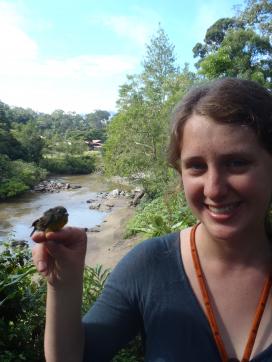 By Roberta Iley (Biological Sciences 3rd Year)
By Roberta Iley (Biological Sciences 3rd Year)
"During summer 2011, I spent three months travelling and living abroad in South East Asia and Australia, learning as much about myself as I did about the ecosystems I went to study.
For the first month and a half of my travels I was living in a hut on a small remote island belonging to Sulawesi, Indonesia. I was collecting data for my dissertation in Biological Sciences out on the coral reefs, something that involved snorkelling every day over some of the most beautiful reefs in the world - it's a tough degree! My project was to look at coral rubble, i.e. fragments of coral rubble that accumulate from human and natural disturbances, and which are often washed up into patches. Inside the crevices and on the large surface areas of these fragments settle a plethora of organisms and I spent hours bent over petri dishes in the lab squinting at beautiful, but tiny, crabs, worms and shrimp. Perhaps the size of the organisms justifies the fact that they have been so poorly studied, but these coral rubble patches are an increasingly important habitat in the wake of such large human impacts on coral reefs and the potential of increasing intensities of storms with climate change.
I was working alongside a number of fantastic PhD students for this project and it was easy to regain a strict work ethic when you did not have the standard distractions of TV and readily available internet. This was really my first taste of living a much more ‘primitive' life without the home comforts that I am all too used to. There was no running water on the island with obvious implications for the bathroom arrangements and when the generator shut down at night, the place was plunged into a darkness that I had never really experienced before. This meant that we went to bed much earlier after the (stunning, holiday brochure-worthy) sunsets and correspondingly rose at the crack of dawn - a time not often seen in the life of an undergraduate student!
Later in the summer I travelled to (Malaysian) Borneo. Here I met up with 23 other Biological Sciences students and four tutors to travel into the depths of the tropical rainforest to a remote field station. For an intensive two weeks we studied an optional Tropical Forest Ecology module with a full complement of fieldwork, lectures and tutorials. The close heat and humidity took some getting used to, as well as the return to ‘squat' toilets, something I had hoped to leave behind in Indonesia. Our days consisted of trekking into the forest armed with our leech socks, trying out different fieldwork techniques and setting up our own research projects. We also spent a very enlightening day with someone from the Royal Society visiting the local oil palm plantations and areas logged for timber. We saw orang-utans up close, as well as a huge variety of other organisms, the most stunning of which were often insects (not everybody's cup-of-tea). These were often best viewed from the veranda of the field centre, which also doubled as a venue for many in-depth biological discussions and debates. These were immensely valuable and provided yet more material for my own self-reflection.
Of course, I have barely scratched the surface of what is out there in South-East Asia, but at least by staying out there for a longer period of time than is usually granted for a holiday, I have been able to become more familiar with tiny pockets of this very ecologically and culturally diverse area. I feel very lucky to have been given the chance to go and have these fantastic experiences, something that really was enabled by the generosity of the Brasenose College Annual Fund."
Third year Biological Sciences students from all Oxford colleges may request to attend one or both of the overseas field courses, each one making up a specialist option. The Borneo field course is run by Brasenose Biology Tutor Owen Lewis; it concerns tropical rainforest ecology, both animals and plants, and is based at the Danum Valley Field Centre in Sabah. The other field course involves a trip to the Canary Island of Tenerife, and studies the systematics, diversity and ecology of the local plant communities.
